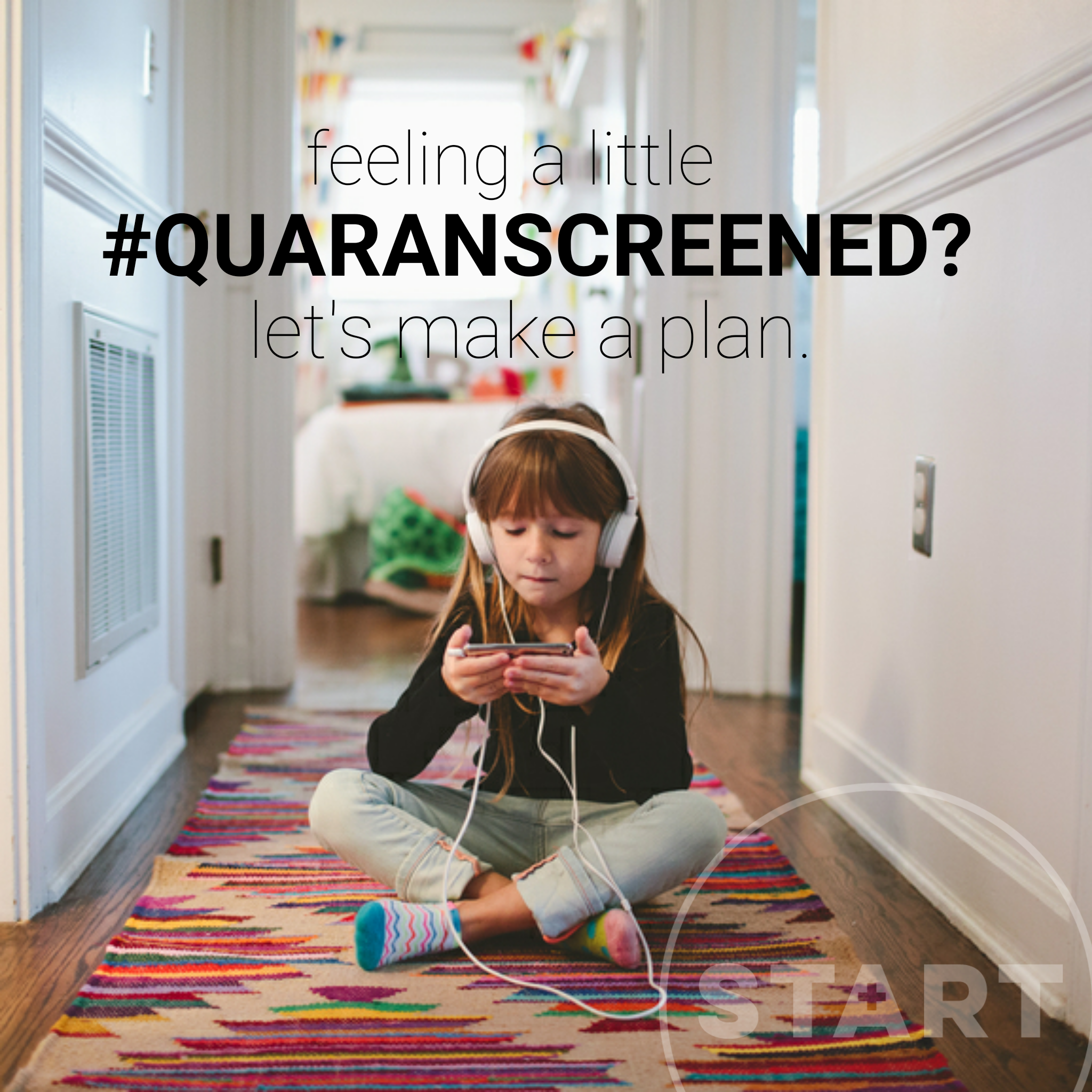


Parenting in the days of quarantine is a juggle of childcare, conference calls, household chores, and emotional roller coasters. Three cheers for the gift of technology to help us survive this process! And yet, we know the same screens that provide a beautiful a lifeline – a way to work, learn, be connected to others, get news updates and much needed comedy breaks– can accidentally cause unintended side effects. Loneliness. Anxiety and depression. Exposure to unsavory content. Indeed, as we’re already seeing from sources in Italy, once lockdown began, screen time for kids (understandably) increased more than 70%. If you are feeling a little #quaranscreened and needing a plan to survive, we gotcha covered! Join us as we walk you through the WHAT and the HOW of creating a family screen plan to help you #quaranscreen well. Together, let’s maximize the gifts of screens – while minimizing unhealthy side effects.
Many of us are just trying to survive this quarantine…and thriving amidst this situation? Not even on the radar. But before we jump into the details of creating a “QuaranScreen plan,” we invite you to pause and reflect about what good could possibly come from this circumstance. Most young children may not remember the daily stats about coronavirus or even the phrase “flatten the curve.” What they will remember is how their home felt during this pandemic.
Make a list of what core values will guide this season—or maybe a rally cry like, “Just keep Swimming” from Finding Dory or “Do the Next Right Thing” from Frozen 2. Ask your kids to join you, co-creating a vision for how you want your family to live this season! Then…hang them up! Whether it is just a handwritten post-it on the fridge or a Pinterest-inspired art print doesn’t matter, but hang your vision in your home as a visual reminder of what your family is striving for.
Even before quarantine, studies showed that we look at our phones 80+ times a day – and based on our own news and social media scrolling amidst this crisis, it’s likely gone up. To avoid “infobesity” – information overload that leads to anxiety and distraction from your real life, we suggest setting a certain number of times each day to check the news, social media, or respond to phone notifications so the rest of your time you can be more focused on your work or family time at hand. Research has shown it often takes people four times as long to do the same task when they are distracted. You can also employ friction—tiny obstacles we add or remove in our routines in order to develop healthier habits. During quarantine, it might help to silence group texts or move the Facebook app off of your homescreen—so it less likely steal your attention from the things you want to prioritize.
Amidst cancelled practices, activities, and meetings, more families than ever will be able (forced) to eat dinner together. We suggest making dinners device-free. Research demonstrates family dinners have [remarkable benefits]. These benefits are not dependent upon an organic, gourmet meal, but they are dependent upon focused time. Consider using dinner to take an emotional temperature check: How are you feeling? What is going well? What could be improved? Or discuss simple highs and lows of the day, answer silly questions, or share family stories.
We also suggest removing devices from kids’ bedrooms overnight. Even before quarantine, nearly 80% of kids were using their devices when they’re supposed to be sleeping, with many waking up throughout the night for every notification. With sleep as a critical factor of mental and physical health, like their devices, our kids need to get a good charge overnight.
During this time when kids are likely on screens longer and with less supervision, they are more likely to accidentally stumble onto unsavory content. Age 10 is now the average age of first pornography exposure for kids, with nearly 90% of scenes portraying a man being violent to a woman. We strongly recommend installing an internet filter like CleanBrowsing, OurPact, Quostodio or Circle on your server (to learn more, visit Protect Young Eyes) and considering a monitoring service like Bark to let you know when they are running into harmful content. Depending on the age of your child, you may want to consider more “gated” sources (e.g., PBS Kids, Disney+, Netflix) rather than less managed sites like YouTube or TikTok. These ideas aren’t 100% foolproof, but you will rest much better knowing a safety net is in place.
In addition to filters, we suggest avoiding using devices in private places like bedrooms or bathrooms-which increases your child’s risk of making poor decisions. Even with safety nets in place, be warned that mistakes will happen, so when your child shares an awkward or shocking situation…don’t overreact. Make it clear to your child that you are safe harbor, and they can tell you anything.
In national surveys, families report that the number one battleground is managing technology. During this time of quarantine, we encourage you to get ahead of those battles by adopting consistent rhythms for screen use. Let consistent, predictable patterns “be the bad guy” so you don’t have to. For example, once kids know that there will be “no screens before noon” or that your family rhythm is “chores, outside time, brain building time, screentime, reset,” they will be less likely to nag, and you will be relieved by less decisions about when to say “no” and when to say “yes.”
Another trick? When it is time to transition your child’s brain off the merry-go-round of screens, use consistent cues. We recommend sitting next to them or touching their shoulder as they finish up their last round of games. Follow this with a round of pushups, a race around the house, or some time outdoors to help their mind reconnect with their body and reengage with the offline world. Please note: there will be times when you realize your family has lost its rhythm. No problem! Give yourself grace. This a great opportunity to show your kids that when life throws curve balls, you don’t give up. Jump back in where you left off, and try again.
The days will be long and emotionally challenging, but if you can, we encourage you to look for some unexpected positives. In quarantines throughout history, Shakespeare wrote King Lear and Isaac Newton developed calculus and discovered gravity. We encourage you to make this season “time well spent” by guiding your kids towards meaningful activities—both online and offline. Here are our top suggestions:
Offline:
● Increase your child’s engagement with chores. Did you know activities like chores are an integral part of your child’s development? Your kids may not whistle while they work, but studies show children who do chores feel more connected to their families and are more successful in their careers as adults.
● Build the muscles to let your kids be bored – and let their brains get curious about the world, and the role they want to play in it. A New York Times article explains, “Boredom teaches you to respond constructively, to make something happen for yourself.” This is a perfect time to build these muscles – and provide you with down time, too.
● If you’re able to go outdoors, consider having at least a 1:1 ratio of time outdoors to time on screens. There are many benefits to time outdoors, including the role sun exposure has in improving our mood – especially important these days.
Online:
● Does your kiddo have a favorite video game or app that you’ve never tried? Surprise them by playing it together. Learn the Fortnite dances. Make a TikTok video. Start a Snapstreak. The more you can learn about and engage in your child’s online world, the more fully you’ll be able to guide and mentor them through adolescence.
● Plan Facetime or Zoom play dates. Much of what we see online is someone talking to us. The more we can be interactive, the more we build relationships. Start short and, for younger kids, provide a topic (e.g., a joke session, Would you Rather questions, or completing a Mad Lib). Another benefit: 93% of communication interpretation is nonverbal (body language and tone). When communication is left to texting or social media, misunderstandings – or even intentional cruelty –can spread easily, and kids often won’t mention it in fears that you won’t understand. Be available to mentor them through these realities.
● Consider screen time that helps children create rather than consume. This includes apps (e.g., Book Creator or PuppetMaster) or online programs (e.g., doodling with Mo Willems – which has had hundreds of thousands of participants).
The days of this crisis will be long, but instead of things getting worse and worse—we hope they get better and better. As we heard from a mother in Wuhan, “Usually one weekend is long enough before I’m ready to send each of us back to school or work. But for SEVEN weeks, we’ve been home together with very little outside influences or distraction, forced to reconnect with one another, learn how to communicate better, give each other space, slow down our pace, and be a stronger family than ever before.” Our hope is that we will one day look back and remember how this season gave us rich memories and deep relationships in ways we otherwise never would have. And maybe we’ll even give thanks for the way we didn’t just survive–we thrived.


It’s hard to establish habits when your kids say you are the “only one.” Now, more than ever, we need time with other parents in our village to talk about our screentime challenges and make a plan. If you are ready to bring this conversation to your community, we invite you to be a #QuaranScreened Champion. Here’s how.